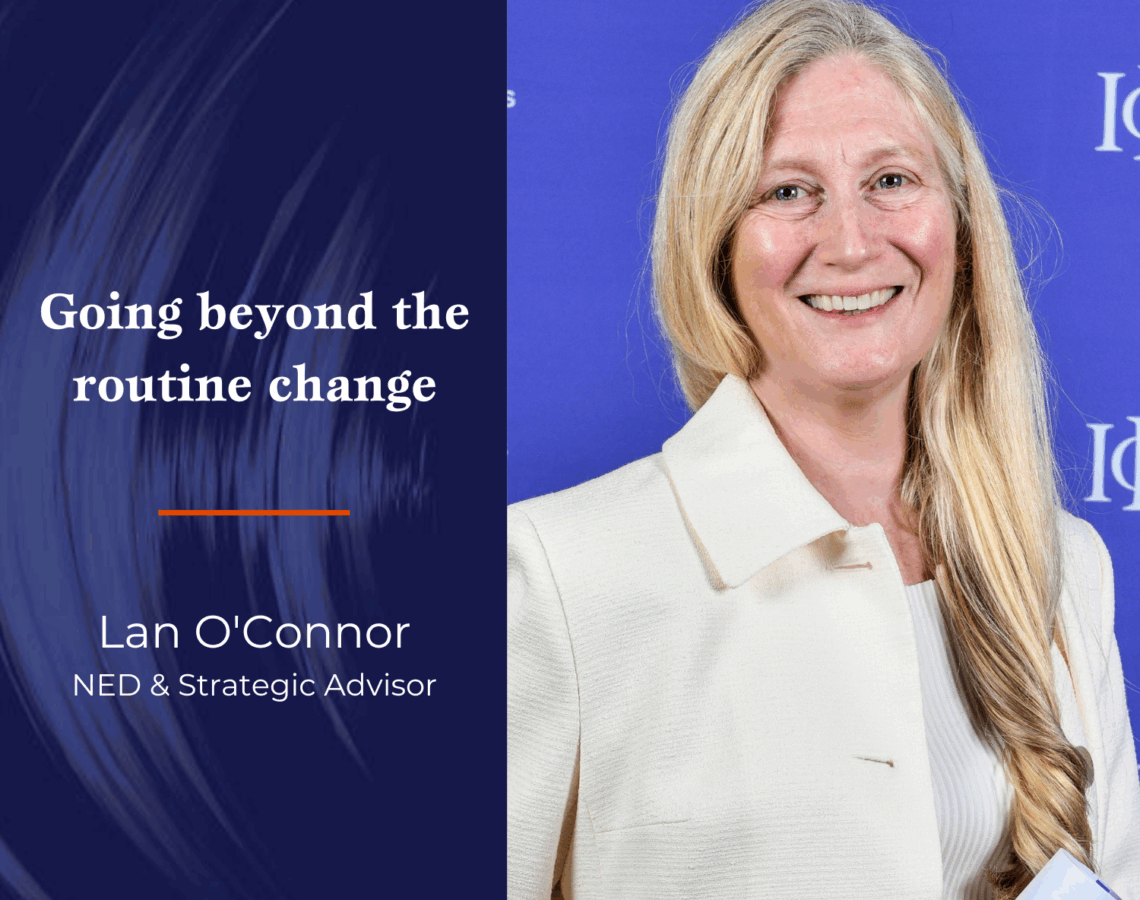Going beyond the routine change

When organisations face a need for transformation, Boards must become catalysts for change. This requires specific behaviours so that Boards can successfully go beyond oversight to provide strategic leadership when it is needed most.
In this podcast, Dr Sabine Dembkowski, Founder and Managing Partner, is joined by Lan O’Connor, a global transformation leader with deep experience in enterprise change. Lan helped lead Capgemini from a European to an international footprint. Her board experience spans Trinity Business School, Landmark Transformation, and Commercial Policy at the UK Cabinet Office during COVID-19. She is also a Fellow of the Royal Society of Arts.
“Change is part of life, part of business life. But transformation, thinking about transformation with a capital T, it’s not a change.”
For Lan, transformation goes beyond routine change. It is a fundamental rewiring and rebalancing of a company’s centre of gravity while retaining the cultural core. It requires four things: agreement that the current state is not viable, an articulated future state, a watertight business case, and a scale so immense that the transformation is the singular agenda for the executive team and Board for the duration of the transformation.
“For a board, often a transformation with a capital T is perceived as a risk with a capital R.”
The role of the Board when it comes to a proposed transformation is not passive oversight. It’s active strategic engagement.
To Lan, in the first Board meeting about a transformation, the role of the Board is to vet the necessity of acting. The second step is to approve the business case. The third step is to scrutinise the approach and execution plans, as Lan believes the execution plan is where failure often hides, and Boards can make a significant difference.
“It’s the Board’s role to make sure that it has a good beginning, a powerful middle, and that the end point allows the company to breathe at the new level.”
Lan sees the Boards as the Executive Producers of a blockbuster movie. Boards must thus address rational, political, and emotional elements in play. The rational element is the business case. The political element ensures the Board and management team can act, make tough decisions, and escalate issues. Emotional elements reflect the level of buy-in needed for the transformation.
“One critical element to have at a board level is an ally versed in the psychology of transformation.”
Many Board members have experience with transformations, but not necessarily as the leader accountable for the change. They need supporting perspectives. A transformation guide can provide support in tough moments, fight process fatigue, and give insights into the pace of change.
“I always say to Board members or even Executive Board members … to adopt a kind of an interview mindset.”
Lan believes that Board members benefit when they can explain what is happening and why in terms that an outsider could understand. This minimises jargon and boosts transparency. It also helps manage Executive Team perceptions and keeps a forward focus. In this way, Boards can step out and experience the impact of the transformation firsthand by being more present in the business without disrupting it.
The top three (plus bonus) takeaways from our conversation for effective boards are:
- Understand the rational, political, and emotional elements.
- Transformation is not forever. It’s also not a one-and-done transaction. Be attentive to the experience of the beginning, middle, and end.
- Mark the official beginning and end of the transformation.
- Transformation practitioners are subject matter experts. Seek out external perspectives to support the transformation experience.
Come Join the Better Boards Community
We’d love to get to know you! If you’d like to become part of the Better Boards community, discover our unique approach, and explore ways to work with us or share your ideas on The Better Boards Podcast Series, drop us a line at info@better-boards.com
Remember to subscribe and never miss an episode of the Better Boards Podcast Series. It’s available on Apple, Spotify, or Google.
To find out how you can participate in the Better Boards Podcast Series or for more information on Better Boards’ solutions, please email us at info@better-boards.com.




